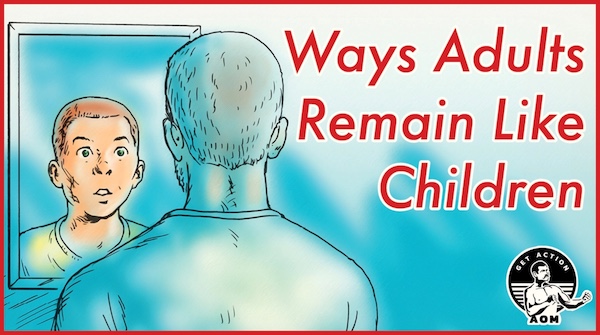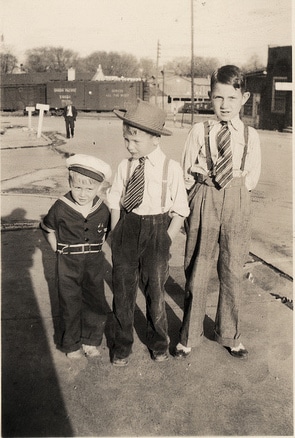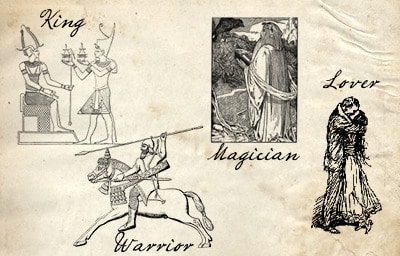In discussions about growing up, you’ll sometimes hear people say something like, “When you’re young, you think adults really have it together. But when you become an adult yourself, you realize grown-ups actually don’t have any idea what they’re doing either!” This is shared as some kind of conspiratorial secret — a ubiquitous-yet-under-discussed truth.
Yet it is largely bollocks — a justification for continuing to flounder even as you advance in age. We personally know plenty of adults who do have it together, who do know what they’re doing, who are able to operate as very capable grown-ups. While it’s true that everyone undergoes continual, sometimes crisis-filled seasons of change, and faces uncharted, and initially perplexing territory throughout their lives, by the time you reach your thirties, you should have developed a decent amount of emotional and practical intelligence — a set of adaptable mental tools that allow you to adequately grapple with any problem, no matter how novel. If you haven’t developed such a capacity, then something has gone wrong either with the upbringing to which you were subjected, or the personal development track you self-selected; either way, this lack ought to be intentionally addressed, rather than excused as a universality.
Nonetheless, while everyone should strive for greater maturity (which is characterized by these 33 marks), it is in truth a state that can never wholly be attained. Given the inherent weaknesses of human nature, and the relative brevity of the lifespan, aspects of our selves invariably remain immature, no matter our age.
And this fact should be understood and acknowledged, not so it can be used as a justification for infantile behavior, but to gain greater compassion for ourselves, and for other people.
So today we’ll unpack just what these areas of perennial immaturity are, using insights from Harry and Bonaro Overstreet’s The Mind Alive (1954), which surfaces the following four ways in which “the human being remains a child all his life”:
Depends on Others for Help
As a child, you are almost completely dependent on adults for your food, shelter, clothing, schedule, recreation, and decision-making. As you grow up, you become more independent and self-reliant . . . but never entirely so.
This is obviously true in a practical sense: we don’t grow the food we eat, make the cars we drive, or create the media we consume, and even the handiest among us still have to occasionally call a plumber or hire a contractor.
But our lifelong dependence is also true when it comes to the realms of emotion and cognition.
Nobody can be on top of it and in control 100% of the time; everyone needs to know they can count on others now and again. There are times in adulthood when one needs a break from taking care of others, in order to be taken care of oneself. As the Overstreets note, there is a kind of dependence an individual “wants to keep — and must be permitted to keep” which involves:
taking time out from his adulthood, now and then, and letting someone else be ‘strong’ in his stead — when he is overtired, lonely, disappointed, or just feeling foolish and irresponsible. If he does not have a healthy chance to abdicate his adulthood occasionally, he tends to abdicate it unhealthily all the time.
Having someone be strong in your stead isn’t just a matter of being able to occasionally lean on people emotionally, but to sometimes delegate your authority to others as well. Being the sovereign decision maker regarding every.single.choice is absolutely exhausting. Sometimes even adults simply need to submit. That’s why people hire a nutrition or fitness coach; “Just tell me exactly what to eat.” “Just tell me exactly what workout to do.” It’s part of why religion is appealing too; even the most mature, self-actualized adult finds it debilitating and paralyzing to try to construct an entirely DIY meaning for life.
No matter your age, there are areas where you simply want someone else to give you the recipe, pass on the instructions, tell you what to do.
Feels Puzzled About Himself
The Overstreets observe: “Every normal youngster . . . is constantly trying to find out who he is, where he comes from, where he fits in, what he wants to do, what he ought to do, and what he can and cannot do.”
Even as we get older, we continue to feel some degree of perplexity about ourselves and our place in the world; in fact, these feelings can only deepen as the questions we ask get more profound and complex, and as the answers we think we receive end up being faulty, or we inexplicably fail to act on those which we know to be true.
Indeed, our “many-sided nature” ensures we often have contradictory impulses that never get fully resolved. This fact drives us back on our inherent dependence on others. As the Overstreets write: “[An adult] never outgrows the need of someone to whom he can turn for insights beyond his own; to whom he can voice his doubts about himself; and who makes him feel he is cared about whole even when he seems to himself a welter of pieces that do not fit together.” This sounding board could be a spouse, friend, mentor, or minister, “But he needs someone.”
Faces Unsolved Social/Relational Problems
A child is constantly having to learn what is expected of him; what the rules are; what is acceptable; what is called for by his human environment. No one of us ever puts this problem behind once for all. We never fully master even the more intimate parts of our social environment: never fully know the few people with whom we live nor the range and depth of our own line of work. Since our social environment keeps changing, moreover, such mastery as we do gain is always becoming dated.
As the Overstreets recognize, no matter your age, you never stop having times when you feel awkward, when you feel like a fish out of water, where you’re not sure how to act and what to do or say. Every person you encounter is a world unto himself, represents a completely unique combination of personality traits, so that you can never know the exact approach to take in befriending, arguing with, leading, or comforting another human being. Each individual you encounter is a new puzzle to unlock, as is each environment in which there resides a group of individuals. And even this is not a one-and-done type challenge: every person and institution, as well as the very fabric of the culture and the structure of the economic marketplace, changes over time, and you change over time, so that even when you do learn the lay of the many interpersonal lands you navigate, you have to update their maps over time, and find new ways to recombine yourself with external realities.
Possesses Undeveloped Capacities
A mature individual should be capable in areas where a duty is placed upon him; he should have the competence to carry out the roles and responsibilities in his life. So too, he should strive towards lifelong learning and becoming a “T-shaped man” — possessing both mastery in one area, and a breadth of knowledge in many others. But, no one has either the time nor the inclination to become competent in every subject and skill. The Overstreets observe:
the human being becomes a grown person not by carrying forward on an even front all the capacities with which he was born, but by the selective development of a few of these and their integration into a working whole. Since we thus grow up by neglecting some of our powers — ignoring them; ruling them out — each of us remains partly undeveloped. We sometimes say of a man that he may be an expert in his own line, but he’s a child when it comes to politics, finance, science, or what not. Every person is a child in those areas where his capacities are scarcely more developed than they were in childhood.
Maybe you’re extremely handy with DIY skills, but understand nothing about how the stock market works. Or you know everything about Russian literature, but not a lick about hunting. Every adult is “mature” is some areas of knowledge, and “immature” in others.
Developing the “Parental Orientation” and Extending Tenderness to the Immature in Yourself and Others
Understanding the ways in which all adults perennially remain as children can help us in two ways.
First, it helps us develop greater self-compassion. As an adult, it can be disorienting and demoralizing to bump against the parts of yourself that haven’t grown up at the same rate as others. But while you should try to address all the resident immaturities in your life, especially those which impinge on your personal progress, you should also realize that continuing to struggle with some of the incompleteness you experienced as a child is normal, natural, inevitable.
In the second place, understanding the ways we remain children helps us develop more patience with other people — an enhanced ability to offer them what the Overstreets call “the indispensable emotion”: tenderness.
The human experience is a difficult one: confusing, uncertain, and pockmarked with pitfalls. There are so many ways, whether one is young or old, to expose one’s immaturities (often attached to insecurities) to others.
These humiliations happen in public:
[An individual] encounters at myriad different points the authority of public opinion or of expert opinion in fields where he is not sure of himself. He talks politics and economics; voices his convictions about art, education, science, religion, world affairs; and joins groups and takes on responsibilities within them. As he enters each situation, his ignorance goes with him as surely as his knowledge; his need for approval and support as surely as his independence.
And they happen within our most intimate relationships, especially the pressure-cooker of marriage, in which a man puts “himself into a position where at least one other person is likely to find out what the ways are in which he has not grown up and what the nagging doubts are that he has about himself.”
Knowing that all of one’s fellow travelers are “lonely, perplexed, and still incomplete in growth,” can allow us to be more tolerant of their shortcomings. As the Overstreets conclude:
What this all comes to is that tenderness in the human scene cannot be simply an emotion that moves along one line in one direction: from parent to offspring. All through life we have to take turns, as it were, being ‘parents’ to one another — because we all take turns at being children. Tenderness, therefore — a warm acceptance of what is incomplete but capable of growth — must be so extended throughout our human society that it becomes a veritable field of force. It must be extended from each person’s strength and maturity to each other person’s weakness and immaturity.
The Overstreets call this stance the “parental orientation,” defining it as “the capacity to extend a warm, nurturing welcome to what is young and undeveloped in a fellow human being.”
Approaching people with tenderness, with the parental orientation, is often needed within marriage, but also within friendships, and with co-workers and strangers too. It is not a patronizing attitude, nor is it a call to “pamper people or to condone evil.” Instead, the Overstreets explain, it “establish[es] the only condition we know under which growth can continuously take place.”
This is to say that when you approach others’ foibles as an opportunity to “blame and belittle; to humiliate and punish; to reproach and scold,” you tend simply to make the person defensive and/or dejected but bring them no closer to learning from their mistakes. If, on the other hand, you approach someone’s immature failings with a “Hey, everyone falls down sometimes; everyone messes up; here’s another way of looking at or doing this that you might consider,” then he or she will have the space and security to actually grow from the experience.
When you’re frustrated with someone (or yourself), it can literally help to step back and see a bewildered eight-year-old in front of you. Just a kid trying to make it in the world. That child within all of us never wholly grows up, and never stops making himself known.
As the Overstreets conclude: “the human being needs to receive tenderness as long as he continues to be mentally and emotionally young in ways that make him feel inadequate and incomplete — which is to say as long as he lives.”








